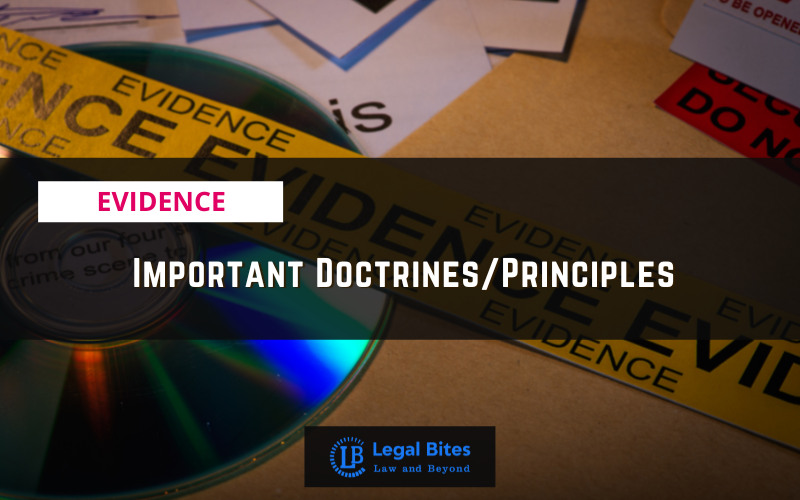Important Doctrines/Principles under Law of Evidence
This article titled ‘Important Doctrines/Principles under Law of Evidence’ deals with various important doctrines and principles used in Evidence.;

This article titled ‘Important Doctrines/Principles under Law of Evidence’ deals with various important doctrines and principles used in the Indian Penal Code along with brief descriptions. Important Doctrines/Principles under Law of Evidence 1. Principle of Res Gestae The Doctrine of Res Gestae is a Latin word that literally means ‘things done’. It accounts for a spontaneous declaration made by a person promptly after an event and before the human mind has an opportunity to...
This article titled ‘Important Doctrines/Principles under Law of Evidence’ deals with various important doctrines and principles used in the Indian Penal Code along with brief descriptions.
Important Doctrines/Principles under Law of Evidence
1. Principle of Res Gestae
The Doctrine of Res Gestae is a Latin word that literally means ‘things done’. It accounts for a spontaneous declaration made by a person promptly after an event and before the human mind has an opportunity to conjure a false story.
2. Rule of Best Evidence
The best evidence rule is a rule in law which states that when evidence such as a document or recording is presented, only the original will be accepted unless there is a legitimate reason that the original cannot be used.
3. Rule against the admissibility of hearsay evidence
The general rule is that hearsay evidence is not admissible in a court of law.
4. Falsus in uno Falsus in Omnibus
Falsus in uno, falsus in omnibus is a Latin term which means “false in one thing, false in everything.”
5. Doctrine of Estoppel
Estoppel is that rule which prohibits a person from contradicting what was earlier said by him in a court of law. Res judicata is that principle which prohibits the other courts from deciding on the same matter, between the same parties which has already been decided by a competent court.
6. Principle of Presumptions
The basic rule of presumption is when one fact of the case or circumstances are considered as primary facts and if they are proving the other facts related to it, then the facts can be presumed as if they are proved until disproved.
7. Doctrine of Privileged Communication
A privileged communication is a conversation between two parties that is legally classified as a private discussion. This discussion is legally protected, and so cannot be disclosed to third parties. The concept is most commonly associated with a discussion between an attorney and a client.
8. Dying Declaration
Dying Declaration is a statement made by the person while he was dying and states the reason for his death. This is made relevant under Section 32(1).


